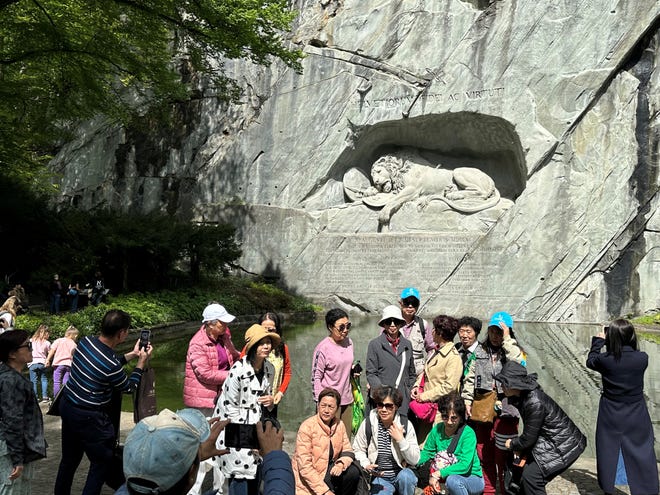
For the past three months, I have had the honor of serving as interim pastor of the International Church of Lucerne in Switzerland, an ecumenical English-speaking congregation whose members come from Singapore, Indonesia, South Africa, Brazil, Colombia, Ireland, Slovakia, Hungary, Ukraine, the UK, France, Italy, Canada, Switzerland, and the U.S. There was a universal sense of community as I stood and preached before this diverse group every Sunday.
During my time in Lucerne, I made multiple visits to the famous Wounded Lion Monument, known as the “Lion of Lucerne.” This incredible sculpture was carved into a sandstone cliff over 200 years ago. It commemorates the 700 Swiss Guards who lost their lives defending the King of France in 1792. The 20-foot-tall, 33-foot-long lion lies with its head bowed, with a broken spear stuck in its back, clearly dying. Mark Twain called it “the most moving and heartbreaking stone statue in the world.”
The haunting beauty of this incredible work of art has led me to visit this garden-like space in the middle of the city many times during the day. There is no admission fee and it is open to the public. And trust me, the public comes in droves.
Besides taking photos and writing in my journal, I also sat on a bench and simply observed the reactions of the busload of tourists. Throughout the day, there was an almost constant stream of “lion hunters.” The look of surprise on their faces when they saw a lion for the first time was remarkable. Smartphones in hand, tourists took multiple photos of the lion from different perspectives. Some even took selfies with the sculptures in the background.
I noticed tour groups from India, Japan, China, Scandinavia, Britain, and various European countries. The variety of languages spoken there reminded me of the countries represented in the church where I used to serve. Yet despite the diversity, there was a sense of unity. The magnificent sculptures provided common ground. There was a sense of harmony and oneness. That carved piece of stone depicted the peace we all yearn for.
The day before my wife and I returned to Seattle, we went to see the lions one last time. Two college-age men were helping an elderly man up the steps in front of the memorial. I struck up a conversation with them. They told me of their joy in helping their 90-year-old grandfather, who lives in Virginia, discover his Swiss roots. Like others I had witnessed over the past few weeks, they were transfixed by what they saw. They stood with the rather frail grandfather, posing for photo after photo with everyone around them. The lions have become great levellers.
When I mentioned I was from the Seattle area, a female tourist walked by and said, “I’m from Poulsbo!” I replied, “Let’s support Sluy’s Bakery!”
I followed a woman in a baseball cap into the crowd, hoping to chat with her about her visit to Lucerne and see if we had any mutual friends in Kitsap County. Unfortunately, she disappeared into the crowd heading for the bus. I wish I had asked her name.
Wendy and I are now back home, but the whole world is watching where we are going: this weekend, representatives from many countries will be gathering in Burgenstock, a mountain resort above Lake Lucerne in central Switzerland.
The purpose of the meeting is to discuss ways to end the bloodshed in Ukraine. Russia and China will not be participating, but other countries determined to find a solution to the global conflict will also be involved in the discussions. They will seek common ground to build bridges between isolated islands. This is an opportunity for those who can only follow developments through the media to pray for the progress of this process.
Due to time restrictions and safety precautions, participants will likely not be able to visit the Lion Memorial, which is less than 30 minutes away. That’s a shame. A visit to the memorial would give world leaders a chance to see what unity looks like; a glimpse of how nations can come together when they come together on common ground.
The Rev. Greg Asimakoupoulos is a retired pastor and descendant of one of Poulsbo’s founding families. He writes an occasional column for the Kitsap Sun.

